- Home
- Clair W. Hayes
Boy Artist. Page 5
Boy Artist. Read online
Page 5
CHAPTER V.
THE INVITATION.
What a pleasant sight it was to see Madge's face, when Raymond was ableto sit up. It was still quiet and calm, but there was a deep gladness init that was beautiful; and the thoughtful care for her brother, the wayin which every wish or desire of his was forestalled, showed plainlythat her love had rather been increased than diminished by that longnursing. She made allowance for all the fretfulness of convalescence,which is so prevalent after severe illness--especially in men or boys,who feel the depression of extreme weakness peculiarly trying--and wasalways patient and bright. One day Raymond, after watching her for someminutes gliding about the room and making things comfortable for him,said to her, "Madge, which is the best life, yours or mine?"
"Mine at present; and yours is going to be," she answered, with her ownquiet smile.
"I've begun to doubt that. Do you know, I've nearly come to theconclusion that I would change with you, and that your unselfish life ismore noble than all the fame and glory I could heap together."
Madge stopped in her work, and looking earnestly at her brother,replied,--
"If that fame and glory is the _only_ object of your life, Raymond, itis not what I thought and hoped it was going to be."
"What do you mean?" he asked, half laughing at her gravity.
"I can't put it as plainly as I want to do; but, Raymond, I mean thatyour painting will not be only for your own glory, if you use itrightly."
Raymond was silent, and his face became very thoughtful. "Madge," hesaid presently, "I don't want that arrowroot. Come over here."
"Wait one moment, dear. I know my duty as nurse better than that. If Ileave this too long it will get quite thin, and then you will call it'horrid stuff,' and not taste it."
Raymond laughed. "You are getting quite tyrannical, Madge. You take anunfair advantage of my weakness."
"I must make the most of my brief authority," she answered merrily; andin another minute she had brought the little tray to his side. "Now whatis it, Raymond?"
"Well, Madge, I've been thinking a great deal, and I've come to theconclusion that it's right for me to go to the shop. I can't rise tofame in painting without some teaching, and I can't get that, and I mustearn money for you."
"But, Raymond, that picture is sold. You know Mr. Smith brought themoney the other day. Why should not others be sold also?"
"And what are you to do meantime, little woman?"
Madge was amused at the grave elder-brother tone, and answered, "As Ihave done before. But let us consult Mr. Smith."
"Very well; but he can't know both sides of the question. Nobody but anartist could understand what it is to me to give up painting--not evenyou, Madge."
Now Mr. Smith had charged Madge to keep it a strict secret from Raymondthat he was an artist. He wished to watch him quietly, for there was alittle scheme of benevolence in the good man's head, which he wanted tocarry out if possible. Many a time had Madge found herself on the pointof telling Raymond about the sitting, and Mr. Smith's studio, and thelovely pictures about it; but she kept her counsel bravely, and had herreward. Raymond often questioned her as to how she had made acquaintancewith Mr. Smith, but she always told him it was through Mr. Jeffery, andturned the conversation; and by degrees his curiosity abated, he becamecontent to receive him as an old friend, and learned to look forward tohis visits as one of his greatest treats.
But with this secret in her possession, it was hardly to be wondered atthat Madge smiled when Raymond deplored Mr. Smith's probable want ofsympathy in his favourite pursuit; but she only said, "He must have sometaste for painting, or he would not have bought your picture."
"You little flatterer! he probably did that because he had a fancy foryou."
At this moment Mrs. Smiley entered the room. She was the bearer of aletter which had just been left by the postman.
It bore a foreign post-mark, and the children knew that it was theirfather's hand-writing. It contained but a few lines, evidently writtenin haste.
"MY DEAR CHILDREN,--I have got an appointment abroad, which will detain me for a long time,--for how long I cannot say. I wish I could have you with me--but this is impossible. I send you L5. It is all I can do at present. Raymond must give up his dabbling, and set to work like a man. I hope you will get on well. I shall see you some day.
--Your affectionate father, RAYMOND LEICESTER."
And this was all! They had looked forward to his coming home. They hadwatched for him day by day. In Raymond's heart there was a strangeyearning to see the face of his only living parent; to know if he wouldbe glad that he had been restored, when he was so near death; and thesefew hurried words were all! They read them through several times. ThenMadge clasped her hands, and hid her face with a low cry.
"Don't, Madge, don't," said Raymond, though his own voice was tremblingwith emotion. "I cannot bear to see you like that."
"O Raymond, will he never come back?"
"Yes; don't you see he says that he will, some day. Meanwhile, we willdo our best."
"_You_ will never leave me, Raymond?"
"Never, if I can help it," he said, laying his long thin fingers on herhair.
"Poor father! Raymond, I did want to see him so much."
"So did I."
They did not speak much more. For some time they only sat holding eachother's hands, and thinking mournfully of the future. Everything seemedvery dark and gloomy that evening, both within and without. A heavy rainwas falling, and the sight of wet roofs and chimney-pots gleaming in thetwilight is never very enlivening. Raymond at last gave a long, deepsigh, at the sound of which Madge started up.
"That won't do, Raymond. I'm forgetting my duty as nurse, and it is verybad for a patient to get vapourish! Oh, here's Mr. Smith!"
He came in, in his own pleasant, friendly way, but his quick eye soondiscovered that something was wrong, for Madge's quiet little face wastroubled, and Raymond looked tired and moody.
Mr. Smith sat down, and began in a lively tone,--"Well, Raymond, my boy,how have things gone to-day? are you any stronger?"
"Not much, sir," he answered mournfully.
"And I don't expect you will be, while you are up here. You want changeof air to set you up."
"I must get well as soon as possible," he said, with a very determinedlook.
"You must not be in too great a hurry. People want a great deal ofpatching up after an illness like yours."
"I must be at work!" said Raymond.
"Yes, when you are well. What is the cause of this extreme impatience?You were quite content yesterday to lie back in your chair and letMadge nurse you and pet you to her heart's content."
Raymond answered by holding out his father's letter. Mr. Smith read itsilently. He made no remark when he had finished it, but handed it backto the boy.
"And now, sir, what are we to do?"
"Get well and strong, my dear boy, in the first place."
"But about the shop, sir? My father said the place was ready, and Icould take it."
"You are not fit for it at present."
"At present!" Then Mr. Smith thought he ought to go when he was well!The thought was very bitter, and Raymond bent his head in his hands, andtears came dropping one by one through his fingers. They came from hisextreme weakness, and he was very much ashamed of them, so much ashamedthat he did not look up until he had banished them. Then Mr. Smithspoke:--
"Little Madge, do you think Raymond is well enough to have a change?"
"There is no place for him to go to, sir," she answered, while there wasa quick throb of pain in her heart at the thought of being separatedfrom him.
"I have a country-house in the Isle of Wight. Will you both come and payme a visit there, and see my little daughter Lilian?"
Madge's face lit up instantly. "Raymond, do you hear? The country--thecountry--and the beautiful sea--and you will get strong there!"
"But I don't kn
ow how we could do it, sir?" said Raymond doubtfully, butin a tone of gladness which showed how much he liked the proposition.
"You must let me be your father for the time, and I will see to it all,"replied Mr. Smith kindly. "Mrs. Nurse, don't you think it would be thebest thing possible for your patient?"
"Oh, yes," she answered gladly.
"Then you must be ready by the end of next week," said Mr. Smith; "andconsider that it is a settled thing. Lilian will be in such delight."

 The Boy Allies with the Terror of the Seas; Or, The Last Shot of Submarine D-16
The Boy Allies with the Terror of the Seas; Or, The Last Shot of Submarine D-16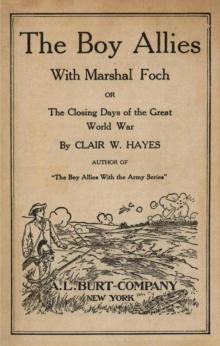 The Boy Allies on the North Sea Patrol
The Boy Allies on the North Sea Patrol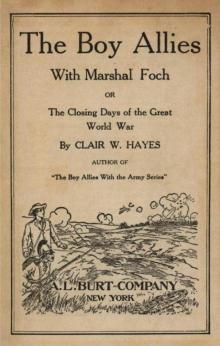 The Boy Allies in the Baltic; Or, Through Fields of Ice to Aid the Czar
The Boy Allies in the Baltic; Or, Through Fields of Ice to Aid the Czar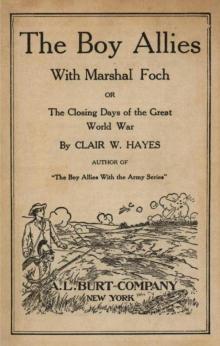 The Boy Allies with Marshal Foch; or, The Closing Days of the Great World War
The Boy Allies with Marshal Foch; or, The Closing Days of the Great World War Boy Allies with Haig in Flanders; Or, the Fighting Canadians of Vimy Ridge
Boy Allies with Haig in Flanders; Or, the Fighting Canadians of Vimy Ridge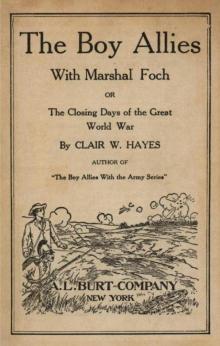 Boy Allies with the Victorious Fleets; Or, The Fall of the German Navy
Boy Allies with the Victorious Fleets; Or, The Fall of the German Navy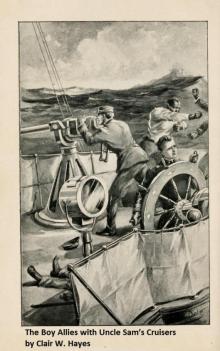 Boy Allies with Uncle Sam's Cruisers
Boy Allies with Uncle Sam's Cruisers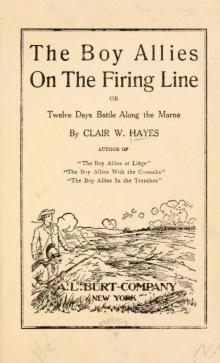 Boy Allies at Liège; Or, Through Lines of Steel
Boy Allies at Liège; Or, Through Lines of Steel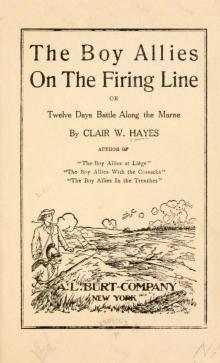 Boy Allies on the Firing Line; Or, Twelve Days Battle Along the Marne
Boy Allies on the Firing Line; Or, Twelve Days Battle Along the Marne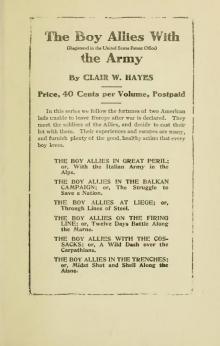 Boy Allies in the Balkan Campaign; Or, the Struggle to Save a Nation
Boy Allies in the Balkan Campaign; Or, the Struggle to Save a Nation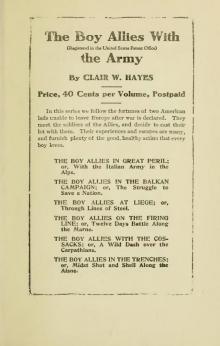 Boy Allies in the Trenches; Or, Midst Shot and Shell Along the Aisne
Boy Allies in the Trenches; Or, Midst Shot and Shell Along the Aisne Boy Artist.
Boy Artist. Boy Allies Under the Sea; Or, The Vanishing Submarines
Boy Allies Under the Sea; Or, The Vanishing Submarines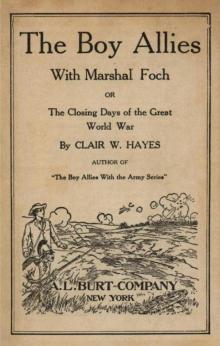 Boy Allies under Two Flags
Boy Allies under Two Flags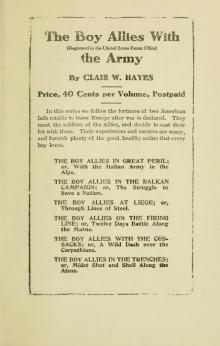 Boy Allies in Great Peril; Or, With the Italian Army in the Alps
Boy Allies in Great Peril; Or, With the Italian Army in the Alps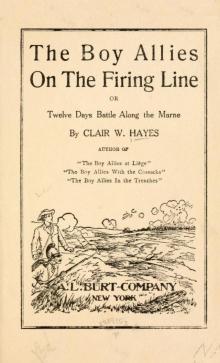 Boy Allies with the Cossacks; Or, A Wild Dash over the Carpathians
Boy Allies with the Cossacks; Or, A Wild Dash over the Carpathians